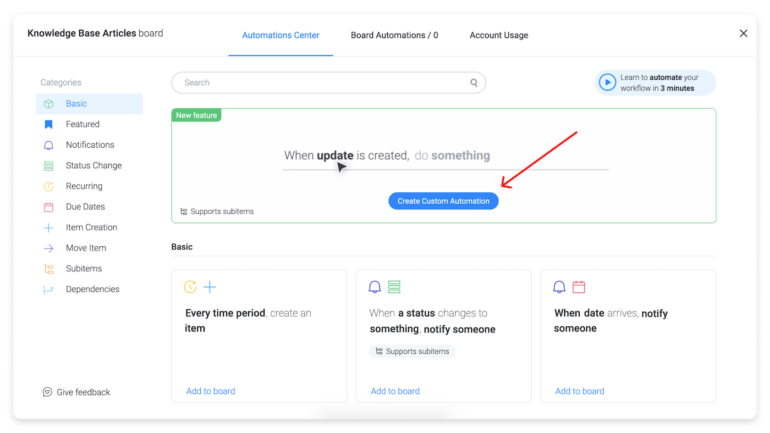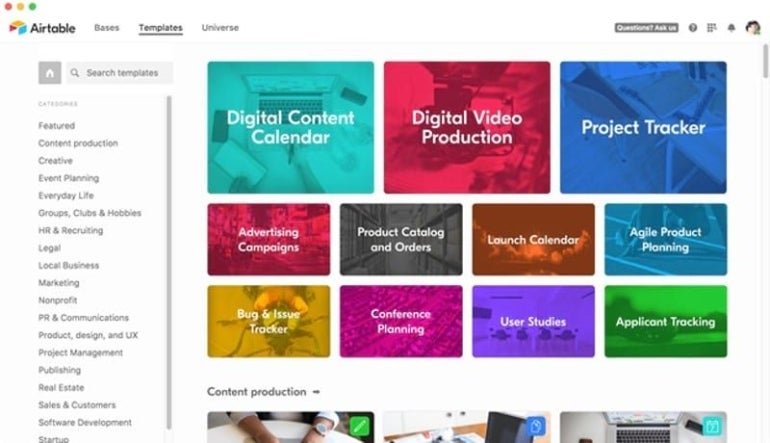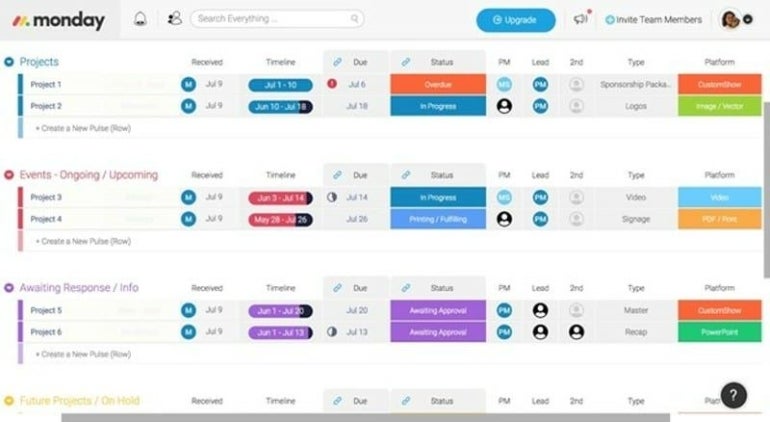
One of the great benefits of the explosion of low-cost, easy-to-use, cloud-based software is there are at least a half-dozen tools to accomplish nearly any task. Project management software solutions Airtable and monday work management take slightly different approaches to solving most teams’ challenges around keeping track of shared projects and work. Let’s explore how Airtable and monday work management compare when it comes to several main features.
Jump to:
Airtable is a cloud-based “intelligent spreadsheet” of sorts that allows users to develop robust applications and tools without delving into traditional software development tools. It offers extensive customization, so you can tailor it to your business needs. For more information, read our full Airtable review.

monday work management adds workflow, customizations and integrations on top of task management, allowing users to build complex, collaborative workflows around any date or task-based task. For more information, read our full monday work management review.
| Features | Airtable | monday.com |
|---|---|---|
| Templates | Yes | Yes |
| Workflow automation | Limited | Yes |
| Team collaboration tools | Yes | Yes |
| Data management style | Tables | Tasks |
| Multiple project views (kanban, list, timeline, etc) | Yes | Yes |
| Mobile app | Yes | Yes |
| Free trial | 14 days | 14 days |
| Free plan | Yes | Yes |
| Starting price (billed monthly) | $10 per user | $8 per user |
Both Airtable and monday work management offer several pricing tiers that are charged per seat per month and billed annually. They also offer an unlimited free plan with limited features.
Aside from its Free plan, monday work management has four pricing tiers. Basic starts at $8 per seat per month, Standard starts at $10 per seat per month and Pro starts at $16 per seat per month. Those interested in the Enterprise plan should contact monday.com’s sales team for more information.
By comparison, Airtable only offers three pricing tiers above its Free plan. Its Plus plan starts at $10 per seat per month, and its Pro plan starts at $20 per seat per month. Similar to monday work management, Airtable doesn’t offer payment details for its Enterprise plan; those interested should contact Airtable’s sales team.
One of the primary benefits of using project management software is that they help you streamline your workflow to save you time. monday work management excels in workflow management (Figure A). You can use an extensive list of task automations and templates and can even program automatic notifications according to your needs.
Figure A

Airtable offers basic automation capability. You can use custom logic to minimize repetitive tasks. To access more advanced automation tools, such as multi-sequence automation, you may need to integrate Airtable with a third-party application.
Perhaps the most important functional difference between Airtable and monday work management is the fundamental nature of how the project management tools manage data. A simplified explanation is that Airtable, as the name implies, uses a table as its foundation for storing data, while monday work management is oriented around tasks.
Think of Airtable as the ultimate spreadsheet where you create a spreadsheet-like set of data — which Airtable calls a base — and then build workflows, integrations and functionality off that base. Airtable is essentially a combination database, workflow engine and set of integrations and collaboration tools.
monday work management uses a task as its core data element, which has inbuilt concepts like due dates, assignees and other fields already defined. There are also pre-built reports, dashboards and workflows. While this task orientation might seem constrained, the project management software has a rich set of templates and functionality that allows users to configure it for any workflow associated with time, from planning digital media releases to managing a sales funnel.
Airtable and monday work management allow easy signup and provide a rich set of templates to get users started.
By virtue of its template universe, Airtable allows users to share their bases as templates (Figure B) the general public can access. monday work management lacks this specific feature, although users can share a link to their boards and essentially share their work with others as long as they have the link provided.
Figure B

Airtable provides more templates when including the user-contributed universe, though the monday work management templates I sampled generally had more documentation and prepopulated elements that demonstrated how to use the template effectively.
The templates provided by both tools are wildly diverse, from real estate and manufacturing to product release and customer relationship management-like templates, allowing users to quickly access a prebuilt example and get a feel for how the tool works.
Airtable and monday work management both offer highly configurable interfaces (Figure C) and similar capabilities to view individual records in various ways, ranging from kanban boards to calendar views. These views will change dramatically based on the template the user selects or the customizations built.
Figure C

However, the underlying view for data in monday work management is some variant of a multilevel task list. In contrast, Airtable’s default view is essentially a configurable table that should be familiar to anyone who’s spent time in a spreadsheet.
The power of these project management tools comes when creating and customizing additional views and adding integrations and workflows that turn Airtable or monday work management from a data repository to a full-fledged workflow engine.
monday work management was designed as a configurable project management tool, and it edges Airtable out on collaboration features. For individual tasks, you can post comments and tag other collaborators using the @ notation and can embed files. Chat messages, files and a nice depiction of task updates are separated in a tabbed view.
Airtable offers a familiar iMessage-style chat feed and @ notation and time-sequenced notes on record changes, but the display is not as visual, nor can files be embedded by default.
This shortcoming could be remedied through intelligent integrations to favored collaboration software, and both tools integrate with popular tools like Slack, Teams and Basecamp.
To compare Airtable and monday work management, we analyzed several parameters, including their core features, advanced tools, user interface, free version and paid plans. We also looked at user ratings and testimonials to have a better understanding of the pros and cons of Airtable and monday work management.
Small businesses will find Airtable and monday work management to be capable of handling their project management tasks. Both software offer an intuitive user interface and easy-to-use core features. However, monday work management offers slightly more functionality, which might be needed by larger companies with more complex projects. The workflow automations and built-in tutorials give a slight edge to monday work management. However, users who are transitioning from Microsoft Excel or other spreadsheet-based solutions may prefer to use Airtable.
Tackle complex projects with Wrike’s award-winning project management software. Break projects into simple steps, assign tasks to team members, and visualize progress with Gantt charts, Kanban boards, and calendars. Manage resource allocation and forecasting with software that’s easy to launch. Automation and AI features strip away time-consuming admin tasks so you can do the best work of your life. Streamline your practices, align your team, and ensure you hit deadlines and stay on budget.
monday.com Work OS is the project management software that helps you and your team plan, execute, and track projects and workflows in one collaborative space. Manage everything from simple to complex projects more efficiently with the help of visual boards, 200+ ready-made templates, clever no-code automations, and easy integrations. In addition, custom dashboards simplify reporting, so you can evaluate your progress and make data-driven decisions.
Rocketlane is purpose-built to run customer facing projects. It uniquely ties project management, document collaboration, and communication to help teams hit their project goals, accelerate time-to-value, and elevate the customer experience.
Cerri Project is a comprehensive PPM solution integrating project portfolio management and strategic planning features to drive value for your business.
Strategic execution of project portfolios, business initiatives and objectives.
Global capacity planning and visibility.
Streamlined workflows with process-driven project management.
Powerful intuitive app to schedule projects in minutes! GanttPRO has all the key elements of classic Gantt charts and introduces indispensable features for project manager: advanced task management, progress tracking, resource and cost management, team collaboration, task time tracking, baselines, project export and sharing, and more.